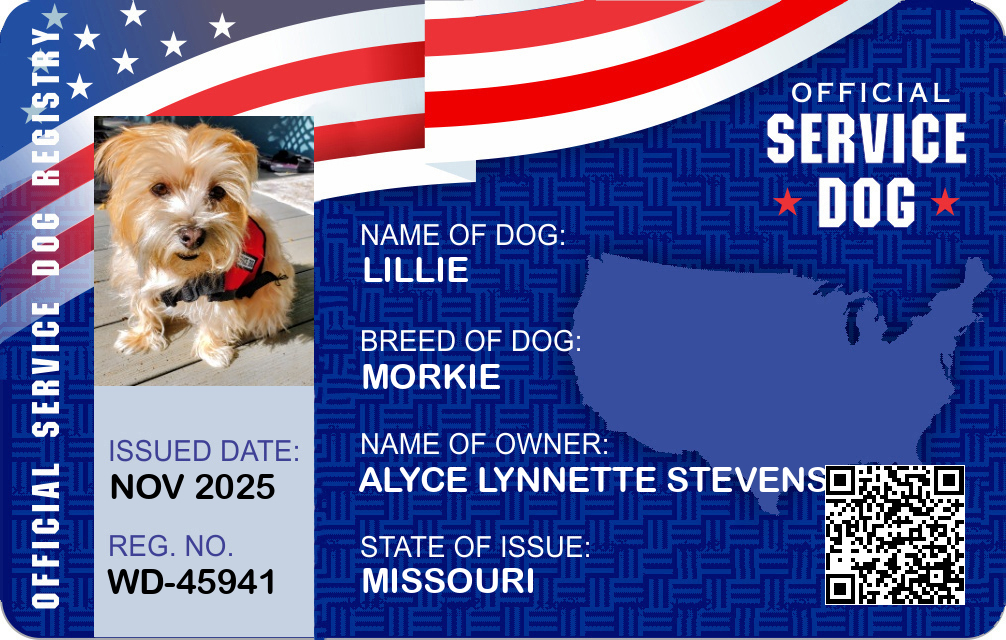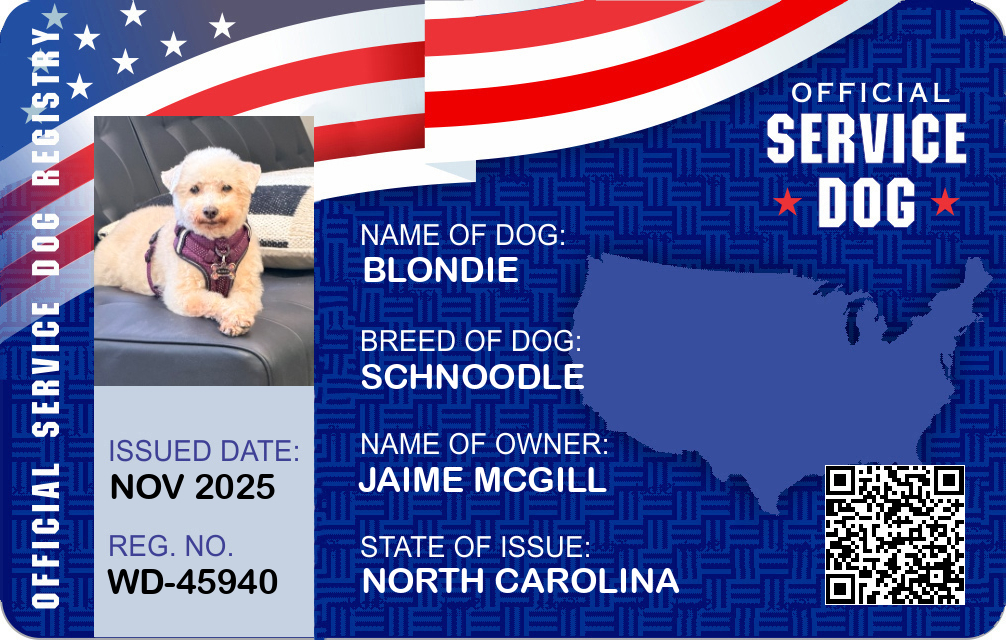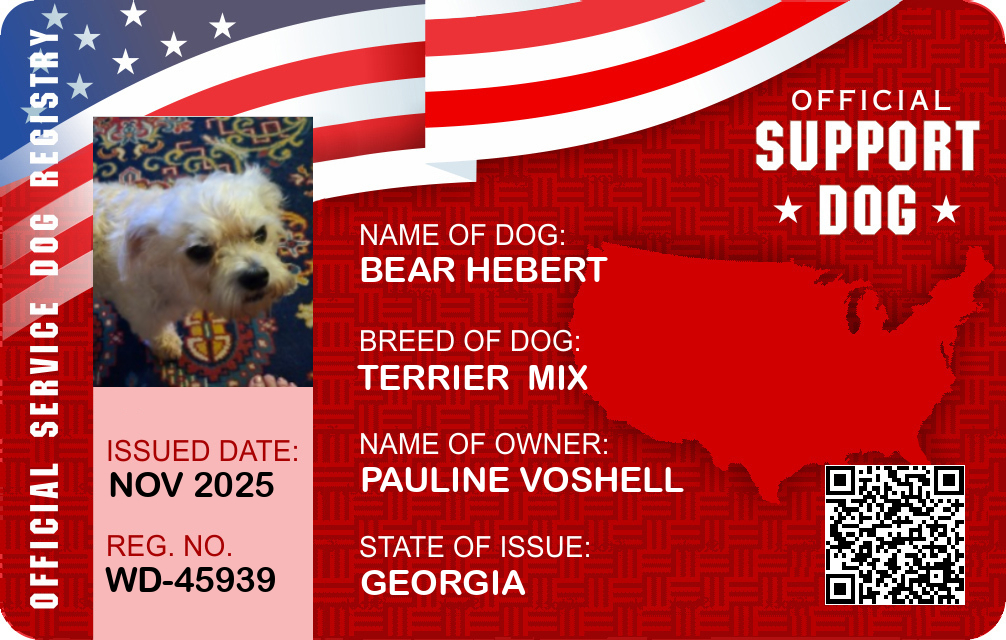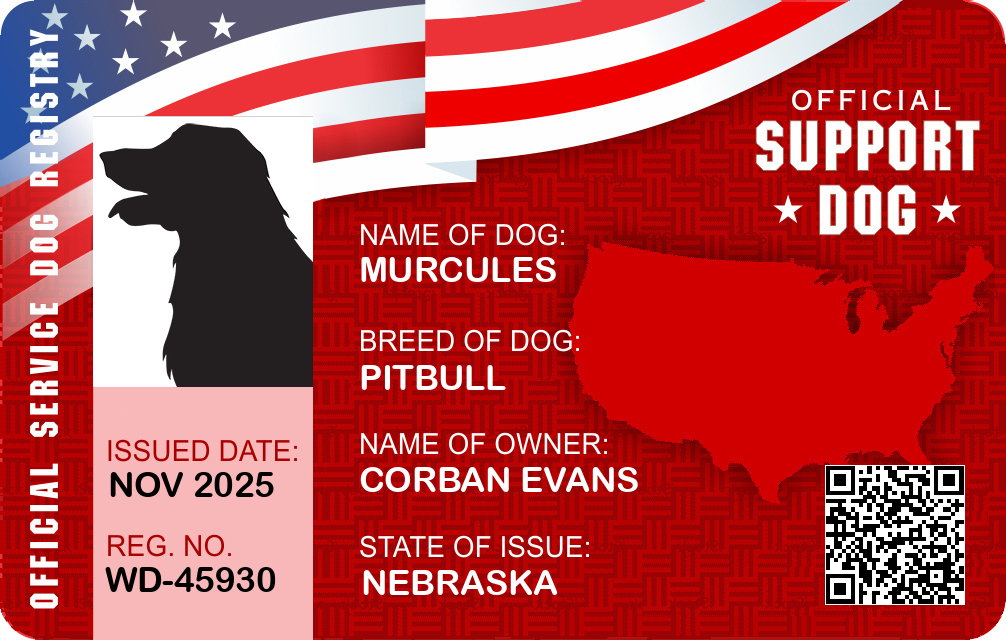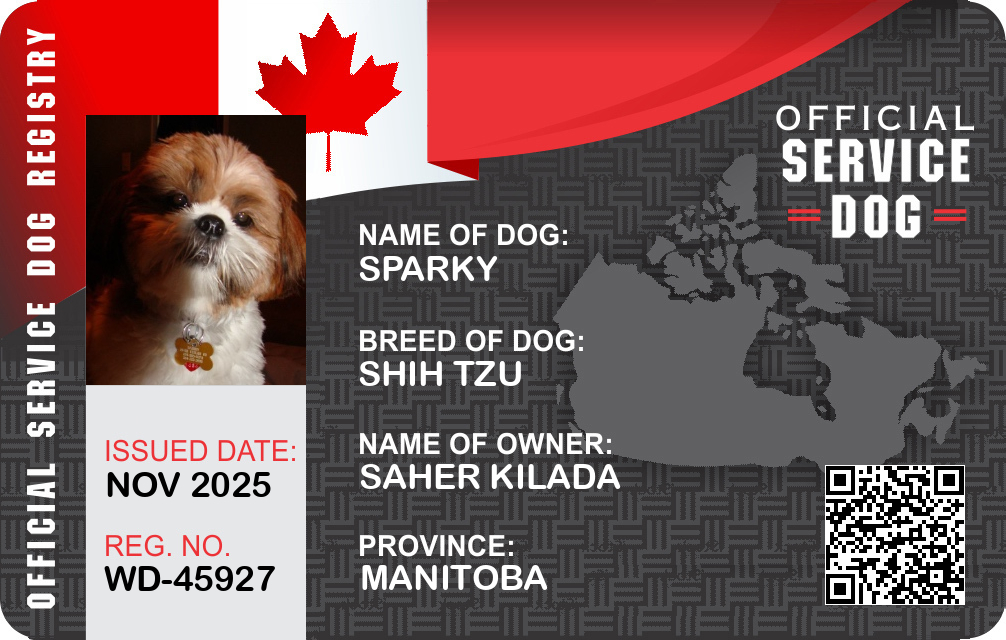Arizona Service Dog Laws
Register Your Dog

Overview of Service Dog and Legal Definitions in Arizona
What is a Service Dog?
A service dog is specially trained to perform tasks for the benefit of an individual with a disability, encompassing various disabilities such as physical, sensory, psychiatric, intellectual, or other mental disabilities. The Americans with Disabilities Act (ADA) defines a service dog as any dog individually trained to work or perform specific tasks for someone with a disability. Tasks may include guiding individuals who are blind, alerting those who are deaf, pulling a wheelchair, or calming someone with PTSD during an anxiety attack. It is crucial to distinguish that service dogs are not pets; they perform essential functions that’ directly contribute to an individual’s ability to participate in everyday life.
How Service Dogs Differ from Other Types of Assistance Animals
Service dogs differ from other assistance animals like emotional support animals (ESAs) and therapy dogs. While ESAs provide comfort through companionship and are often part of a therapeutic plan due to emotional or psychological challenges, they are not trained to perform specific tasks related to a disability. Consequently, ESAs do not have the same access rights under the ADA as service dogs. Likewise, therapy dogs, often used in therapeutic settings to provide psychological or physiological therapy, do not possess rights of access to public accommodations under federal law. In Arizona, service dogs are uniquely recognized and given certain legal accommodations due to their role in mitigating specific disabilities.
Key Federal Laws Affecting Service Dogs (e.g., ADA, FHA, ACAA)
Federal laws significantly influence the regulations surrounding service dogs in Arizona. Primarily, the ADA mandates that service dogs be allowed to accompany their handlers in public spaces and facilities where the general public is permitted. This includes businesses, government buildings, and nonprofit organizations. Under the Fair Housing Act (FHA), individuals with disabilities are entitled to request reasonable accommodations for their service animals in housing, even in properties with no-pet policies. Similarly, the Air Carrier Access Act (ACAA) preserves the rights of service animal handlers to travel with their service dogs on U.S. air carriers. These overarching federal laws lay the groundwork upon which state laws and specific rights within Arizona are framed.
State-Specific Service Dog Laws in Arizona
Housing Rights and Responsibilities
In Arizona, housing providers are bound by the FHA to make reasonable accommodations for service dogs and ESAs. This means landlords must allow individuals to live with their service dogs regardless of any pet policies or restrictions they have in place. While the service dog itself is free of pet fees, handlers are responsible for any damage caused by the animal. Importantly, this extends to all forms of housing, whether government-subsidized or private. Service dog handlers should provide reliable documentation if their disability is not obvious, highlighting the necessity of the service dog to alleviate the impact of their disability.
Public Access and Accommodation
Service dogs are permitted in all public accommodations across Arizona under the ADA. This includes shops, restaurants, hotels, governmental offices, and educational institutions. Business owners cannot require documentation proving the animal’s status and training but can inquire if the dog is a service animal required because of a disability and what task the dog has been trained to perform. Denying access to a service dog and its handler could result in legal ramifications, including penalties and mandatory training for staff to ensure ADA compliance.
Transportation and Travel Rules
The Arizona Department of Transportation requires that service dogs be accommodated in public transit systems, including buses and trains, without additional charges or demanding documentation. This aligns with the ADA and ACAA guidelines, ensuring seamless travel and mobility for persons with disabilities within the state.
Employment and Workplace Considerations
While Arizona does not have separate state laws governing service dogs in employment, the ADA’s Title I mandates that employers with 15 or more employees accommodate service animals for employees with disabilities. Employers may require documentation about the need for a service dog as part of a reasonable accommodation request. However, they must respect the nature of the service animal and the privacy of the employee’s disability unless the task performed by the service animal is not apparent.
Documentation, Requirements, and Processes in Arizona
Service Dog Documentation and Who Can Issue It
Unlike ESAs, which often require a prescription or recommendation from a licensed mental health professional, service dogs do not require formal documentation or certification. In Arizona, no legal requirement exists mandating a service dog be registered, certified, or tagged. However, reputable training programs or professional trainers may provide identification to ease public access barriers, although businesses cannot demand to see such proof by law.
Landlord, Business, and Provider Verification Rules
Arizona echoes federal law by restricting the extent of verification that landlords or businesses can request when it comes to service dogs. They are limited to asking whether the dog is required because of a disability and what tasks they perform. It is a breach of legal rights to ask for disability details or demand documentation for the animal, and doing so could result in discrimination claims against the entity.
Rights, Limitations, and Legal Risks
Rights Service Dog Handlers Have in Arizona
Arizona adheres to the ADA in granting individuals with disabilities the right to be accompanied by their service dogs in most areas accessible to the public. Service dog handlers are entitled to equal housing opportunities, access to public and government facilities, and transportation without facing discrimination or extra charges strictly due to their use of a service dog.
Limits on Service Dog Protections and Common Restrictions
Despite the broad access rights provided under the ADA, service dogs can be restricted under certain circumstances. In Arizona, others have the authority to ask that a service dog be removed if it displays aggressive behavior, is out of the handler’s control, or is not house-trained. Service dogs can be excluded from spaces where their presence would fundamentally alter the nature of the goods, services, or programs provided.
Penalties for Fraud or Misrepresentation
Attempting to falsely represent a pet as a service dog for the purpose of access or financial advantage is illegal in Arizona. Engaging in such fraudulent activities could result in civil penalties, including fines and other disciplinary actions. This protects the integrity of service dog programs and ensures that individuals truly reliant on service dogs for their disabilities receive appropriate accommodations.
Practical Guidance for Service Dog Handlers in Arizona
How to Qualify for a Service Dog Legitimately
Individuals seeking a service dog in Arizona should identify whether their disability can be mitigated by a service animal. Ideally, this involves a consultation with medical professionals or certified service dog trainers. Training can be done personally, or one may engage a professional trainer to ensure the dog meets the standards necessary to perform essential tasks.
How to Talk to Landlords, Airlines, and Employers
Effective communication is crucial when discussing service dogs with landlords, airlines, or employers. When approaching sensitive topics, handlers should come prepared with any documentation validating their need for a service dog, when necessary, and be ready to explain the tasks performed by the dog. Understanding and articulating rights and duties under the ADA often facilitate smoother interactions and prevent misunderstandings.
Summary of Service Dog Laws in Arizona
In conclusion, the legislative framework around service dogs in Arizona is grounded in ADA guidelines, providing expansive access and rights to individuals with disabilities. Arizona respects federal provisions while fostering a legal environment where service dogs assist their handlers in living more independent lives.
Key points for service dog handlers in Arizona to remember include:
- Service dogs are not pets but working animals trained to perform tasks directly related to a person’s disability.
- The ADA grants access rights in public accommodations and public transportation systems without additional fee requirements.
- Landlords must provide reasonable accommodations under the FHA without additional pet fees, but service dogs must not cause damage or disturbances.
- Service dog handlers must ensure their dog is well-behaved, under control, and house-trained to maintain rights of access.
- Fraudulent representation of a pet as a service dog is unlawful and subject to penalties, conserving the integrity of access rights in Arizona.
By acknowledging these rights and responsibilities and applying a proactive communication approach, service dog handlers can effectively advocate for their rights and ensure harmonious coexistence with non-disabled members of the community.



